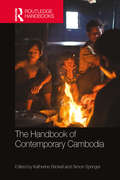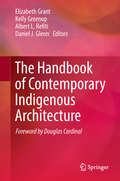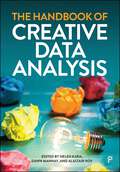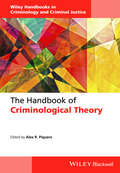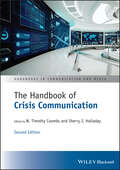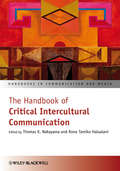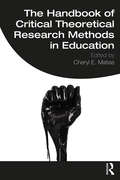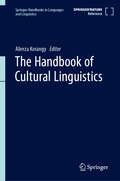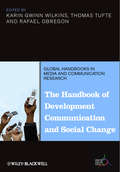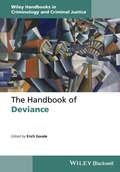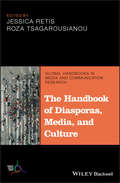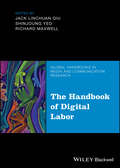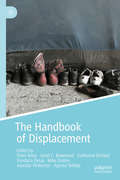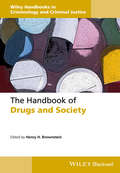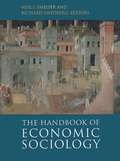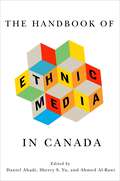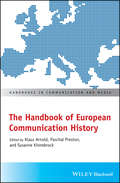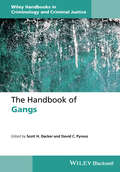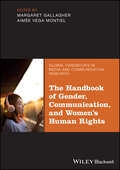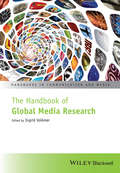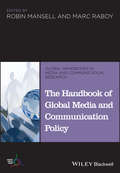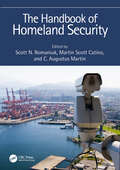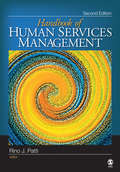- Table View
- List View
The Handbook of Contemporary Cambodia
by Katherine Brickell and Simon SpringerOffering a comprehensive overview of the current situation in the country, The Handbook of Contemporary Cambodia provides a broad coverage of social, cultural, political and economic development within both rural and urban contexts during the last decade. A detailed introduction places Cambodia within its global and regional frame, and the handbook is then divided into five thematic sections: Political and Economic Tensions Rural Developments Urban Conflicts Social Processes Cultural Currents The first section looks at the major political implications and tensions that have occurred in Cambodia, as well as the changing parameters of its economic profile. The handbook then highlights the major developments that are unfolding within the rural sphere, before moving on to consider how cities in Cambodia, and particularly Phnom Penh, have become primary sites of change. The fourth section covers the major processes that have shaped social understandings of the country, and how Cambodians have come to understand themselves in relation to each other and the outside world. Section five analyses the cultural dimensions of Cambodia’s current experience, and how identity comes into contact with and responds to other cultural themes. Bringing together a team of leading scholars on Cambodia, the handbook presents an understanding of how sociocultural and political economic processes in the country have evolved. It is a cutting edge and interdisciplinary resource for scholars and students of Southeast Asian Studies, as well as policymakers, sociologists and political scientists with an interest in contemporary Cambodia.
The Handbook of Contemporary Indigenous Architecture
by Kelly Greenop Elizabeth Grant Albert L. Refiti Daniel J. GlennThis Handbook provides the first comprehensive international overview of significant contemporary Indigenous architecture, practice, and discourse, showcasing established and emerging Indigenous authors and practitioners from Australia, Aotearoa New Zealand, the Pacific Islands, Canada, USA and other countries. It captures the breadth and depth of contemporary work in the field, establishes the historical and present context of the work, and highlights important future directions for research and practice. The topics covered include Indigenous placemaking, identity, cultural regeneration and Indigenous knowledges. The book brings together eminent and emerging scholars and practitioners to discuss and compare major projects and design approaches, to reflect on the main issues and debates, while enhancing theoretical understandings of contemporary Indigenous architecture.The book is an indispensable resource for scholars, students, policy makers, and other professionals seeking to understand the ways in which Indigenous people have a built tradition or aspire to translate their cultures into the built environment. It is also an essential reference for academics and practitioners working in the field of the built environment, who need up-to-date knowledge of current practices and discourse on Indigenous peoples and their architecture.
The Handbook of Creative Data Analysis
by Kate Wall Alex Morgan Sarah Healy David Duncan Peter Cook Lauren White Dawn Wink Katherine Davies Claire Coleman Steve Higgins Neil Kenny Erin Roberts Jennifer Leigh Nick Fuller Adam Carter Nick Pidgeon Karen Gray Kate Carruthers Thomas Nicole Brown Laura Mazzoli Smith Jennifer Hiscock Kathryn Coleman Katherine Broomfield Hazel Partington Emmajane Milton Andrew James Davies Amie Hodges Anuja Cabraal Charlotte Barratt Chloe East Kyla Tully Louise Couceiro Mar Estupiñán Fdez. de Mesa Melvina Woode Owusu Makeda Gerressu India Henry Chantel Sealey Gwenda Hughes Catherine H Mercer Melanie Roberts Anne Collis Naomi Clarke-Mordy Rachel Kurtz Shehr Bano Zaidi Stuart Neilson Louise Gascoine Lauren Gawne Jacqueline Dodding Emma Lazenby Merryn Thomas Karen Henwood Jacquie Ridge Jessica Mannion Abbey MacDonald Karen Hammond Sarah Koops Anna McConnell Cally Haynes Claudia Caltagirone Marion Kieffer Emily Draper Anna Slater Kristin Hutchins Davita Watkins Nathalie Busschaert Larissa K.S. von KrbekCreative research methods for data generation have expanded over recent decades and researchers are eager to take a creative approach to data analysis. It is challenging to bring creativity into data analysis while retaining a systematic, rigorous, and ethical approach. Written by experts in the field, this handbook addresses these challenges. The chapters adapt analytical techniques in creative ways for novice and expert researchers. Existing and novel methods from analysis of quantitative data to embodied, performative, visual, written, arts-based, and collaborative analysis are featured with case examples that are transferable across disciplines. This collection offers a definitive practical guide to creative data analysis.
The Handbook of Criminological Theory (Wiley Handbooks in Criminology and Criminal Justice #4)
by Alex R. PiqueroAn indispensable resource for all levels, this handbook provides up-to-date, in-depth summaries of the most important theories in criminology. Provides original, cutting-edge, and in-depth summaries of the most important theories in criminology Covers the origins and assumptions behind each theory, explores current debates and research, points out knowledge gaps, and offers directions for future research Encompasses theory, research, policy, and practice, with recommendations for further reading at the end of each essay Features discussions of broad issues and topics related to the field, such as the correlates of crime, testing theory, policy, and prediction Clearly and accessibly written by leading scholars in the field as well as up-and-coming scholars
The Handbook of Crisis Communication (Handbooks in Communication and Media #23)
by W. Timothy Coombs Sherry J. HolladayThe revised and updated new edition of the comprehensive guide to crisis communication research and practice The Handbook of Crisis Communication provides students, researchers, and practitioners with a timely and authoritative overview of the dynamic field. Contributions by an international team of 50 leading scholars and practitioners demonstrate various methodological approaches, examine how crisis communication is applied in a range of specific contexts, discuss the role of culture and technology in crisis communication, and present original research of relevance to the development and evaluation of crisis communication theory. Now in its second edition, the Handbook covers the latest advances in global crisis communication technology, current trends in research and practice, social media in crisis communication, and more. Each of the 38 chapters incorporate new material offering fresh insights into existing areas of crisis communication and explore new and emerging lines of research. A wealth of new case studies, practical scenarios, and in-depth analyses of recent crises are integrated throughout. Examines traditional applications, recent advances, and emerging areas in crisis communication Discusses communication approaches for organizational crises, disasters, political crises, and public health crises Provides up-to-date coverage of the latest terminology, methods, and research trends in the field Highlights how crisis communication theory and research can inform real-world practice Features detailed analyses of crisis communication in major events such as terrorist attacks, natural disasters, industrial accidents, and global pandemicsThe Handbook of Crisis Communication, Second Edition is an excellent textbook for advanced students in public relations and strategic communication programs, and a valuable reference for researchers and practitioners in fields such as crisis communication, public relations, and corporate communication.
The Handbook of Critical Intercultural Communication (Handbooks in Communication and Media #19)
by Thomas K. Nakayama Rona Tamiko HalualaniThe Handbook of Critical Intercultural Communication aims to furnish scholars with a consolidated resource of works that highlights all aspects of the field, its historical inception, logics, terms, and possibilities. A consolidated resource of works that highlights all aspects of this developing field, its historical inception, logics, terms, and possibilities Traces the significant historical developments in intercultural communication Helps students and scholars to revisit, assess, and reflect on the formation of critical intercultural communication studies Posits new directions for the field in terms of theorizing, knowledge production, and social justice engagement
The Handbook of Critical Theoretical Research Methods in Education
by Cheryl E. MatiasThe Handbook of Critical Theoretical Research Methods in Education approaches theory as a method for doing research, rather than as a background framework. Educational research often reduces theory to a framework used only to analyze empirically collected data. In this view theories are not considered methods, and studies that apply them as such are not given credence. This misunderstanding is primarily due to an empiricist stance of educational research, one that lacks understanding of how theories operate methodologically and presumes positivism is the only valid form of research. This limited perspective has serious consequences on essential academic activities: publication, tenure and promotion, grants, and academic awards. Expanding what constitutes methods in critical theoretical educational research, this edited book details 21 educationally just theories and demonstrates how theories are applied as method to various subfields in education. From critical race hermeneutics to Bakhtin’s dialogism, each chapter explicates the ideological roots of said theory while teaching us how to apply the theory as method. This edited book is the first of its kind in educational research. To date, no other book details educationally just theories and clearly explicates how those theories can be applied as methods. With contributions from scholars in the fields of education and qualitative research worldwide, the book will appeal to researchers and graduate students.
The Handbook of Cultural Linguistics (Springer Handbooks in Languages and Linguistics)
by Alireza KorangyBringing together a wide selection of work on cultural linguistics and pragmatics, this comprehensive handbook offers global, comparative insights into the field. Diversity does not always imply differences, but it also offers insights into surprising similarities and parallels when it comes to expressions. By the same token, this collection shows that when we see that linguistic differences, when they exist, stem from not merely language, but from the cultural and historical context that cultivates and nurtures them. Within that paradigm, then, this handbook locates the importance of philosophy, religion (or even the lack thereof), political affiliations, and so on, in forming expressions. In addition, comparisons with other models of cultural linguistics are undertaken. These trends provide readers with a comprehensive introduction to issues in cultural linguistics, addressing the peculiarities of the field under the rubric of localized studies, and speaking to the possibilities that exist in interpretation of what metaphors are. The book highlights the complexities that are so tightly interwoven into the fabric of every word and a sentence, across cultures and linguistic traditions. A must-have collection for anthropologists, philosophers, linguists, philologists, theoreticians, rhetoricians, and scholars of poetics, this is the one-stop reference in cultural linguistics.
The Handbook of Development Communication and Social Change (Global Handbooks in Media and Communication Research)
by Thomas Tufte Rafael Obregon Karin Gwinn WilkinsThis valuable resource offers a wealth of practical and conceptual guidance to all those engaged in struggles for social justice around the world. It explains in accessible language and painstaking detail how to deploy and to understand the tools of media and communication in advancing the goals of social, cultural, and political change. A stand-out reference on a vital topic of primary international concern, with a rising profile in communications and media research programs Multinational editorial team and global contributors Covers the history of the field as well as integrating and reconceptualising its diverse perspectives and approaches Provides a fully formed framework of understanding and identifies likely future developments Features a wealth of insights into the critical role of digital media in development communication and social change
The Handbook of Deviance (Wiley Handbooks in Criminology and Criminal Justice)
by Erich GoodeThe Handbook of Deviance is a definitive reference for professionals, researchers, and students that provides a comprehensive and engaging introduction to the sociology of deviance. Composed of over 30 essays written by an international array of scholars and meticulously edited by one of the best known authorities on the study of deviance Features chapters on cutting-edge topics, such as terrorism and environmental degradation as forms of deviance Each chapter includes a critical review of what is known about the topic, the current status of the topic, and insights about the future of the topic Covers recent theoretical innovations in the field, including the distinction between positivist and constructionist perspectives on deviance, and the incorporation of physical appearance as a form of deviance
The Handbook of Diasporas, Media, and Culture (Global Handbooks in Media and Communication Research)
by Roza Tsagarousianou Jessica RetisA multidisciplinary, authoritative outline of the current intellectual landscape of the field. Over the past three decades, the term ‘diaspora’ has been featured in many research studies and in wider theoretical debates in areas such as communications, the humanities, social sciences, politics, and international relations. The Handbook of Diasporas, Media, and Culture explores new dimensions of human mobility and connectivity—presenting state-of-the-art research and key debates on the intersection of media, cultural, and diasporic studies This innovative and timely book helps readers to understand diasporic cultures and their impact on the globalized world. The Handbook presents contributions from internationally-recognized scholars and researchers to strengthen understanding of diasporas and diasporic cultures, diasporic media and cultural resources, and the various forms of diasporic organization, expression, production, distribution, and consumption. Divided into seven sections, this wide-ranging volume covers topics such as methodological challenges and innovations in diasporic research, the construction of diasporic identity, the politics of diasporic integration, the intersection of gender and generation with the diasporic condition, new technologies in media, and many others. A much-needed resource for anyone with interest diasporic studies, this book: Presents new and original theory, research, and essays Employs unique methodological and conceptual debates Offers contributions from a multidisciplinary team of scholars and researchers Explores new and emerging trends in the study of diasporas and media Applies a wide-ranging, international perspective to the subject Due to its international perspective, interdisciplinary approach, and wide range of authors from around the world, The Handbook of Diasporas, Media, and Culture is ideal for undergraduate and graduate students, teachers, lecturers, and researchers in areas that focus on the relationship of media and society, ethnic identity, race, class and gender, globalization and immigration, and other relevant fields.
The Handbook of Digital Labor (Global Handbooks in Media and Communication Research)
by Richard Maxwell Jack Linchuan Qiu ShinJoung YeoProvides a global perspective on labor and technology, exploring resistance, solidarity, and alternatives in digital capitalism The Handbook of Digital Labor critically examines how digital technologies are reshaping work and employment around the globe. Bridging historical and contemporary perspectives, this timely volume explores the dynamics of labor within digital capitalism using a critical framework that illuminates the systemic challenges faced by workers across diverse sectors. Dozens of contributing authors address key challenges including surveillance, inequality, and environmental exploitation, while highlighting innovative forms of resistance and organizing. Organized into four sections???Working-Class Resistance, Digital Capitalism and Alternatives, Laboring under Digital Capitalism, and Theorizing Digital Labor???the Handbook offers a nuanced understanding of how workers navigate the intersection of technological advancement and capitalist development. In-depth chapters cover topics ranging from platform work to AI-driven labor processes???shedding light on the realities of digital labor. Equipping readers with the tools to critically engage with labor struggles across diverse industries and geographies, the Handbook of Digital Labor: Offers interdisciplinary insights from leading scholars in media, communication, labor studies, political economy, as well as unionists, activists, and other on-the-ground practitioners Presents both historical and contemporary analyses of labor conditions under digital capitalism Advocates for actionable strategies to empower labor movements and build equitable and sustainable alternatives Features real-world case studies of worker resistance and solidarity across platforms and industries Emphasizing both theory and praxis, the Handbook of Digital Labor is ideal for advanced undergraduate and graduate students, junior faculty, and researchers in media studies, labor sociology, and public policy. It is a vital resource for courses on digital labor, political economy, and social change within communications and technology programs. Labor organizers, policymakers, and industry professionals will find it an indispensable guide to navigating the complexities of work in the digital age.
The Handbook of Displacement
by Vandana Desai Peter Adey Katherine Brickell Janet C. Bowstead Mike Dolton Alasdair Pinkerton Ayesha SiddiqiThis Handbook provides the knowledge and tools needed to understand how displacement is lived, governed, and mediated as an unfolding and grounded process bound up in spatial inequities of power and injustice. The handbook ensures, first, that internal displacements and their everyday (re)occurrences are not overlooked; second, it questions ‘who counts’ by including ‘displaced’ people who are less obviously identifiable and a clearly circumscribed or categorised group; third, it stresses that while displacement suggests mobility, there are also periods and spaces of enforced stillness that are not adequately reflected in the displacement literature; and fourth, it re-evokes and explores the ‘place’ in displacement by critically interrogating peoples’ ‘right to place’ and the significance of placemaking, unmaking, and remaking in the contemporary world. The 50-plus chapters are organised across seven themes designed to further develope interdisciplinary study of the technologies, journeys, traces, governance, more-than-human, representation, and resisting of displacement. Each of these thematic sections begin with an intervention which spotlights actions to creatively and strategically intervene in displacement. The interventions explore myriad meanings and manifestations of displacement and its contestation from the perspective of displaced people, artists, writers, activists, scholar-activists, and scholars involved in practice-oriented research. The Handbook will be an essential companion for academics, students, and practitioners committed to forging solidarity, care, and home in an era of displacement.
The Handbook of Drugs and Society (Wiley Handbooks in Criminology and Criminal Justice)
by Henry H. BrownsteinThis handbook provides a comprehensive examination of the past and present roles of drugs in society with a focus on theory, research, policy, and practice. Includes 28 original chapters with multi-disciplinary and international perspectives by top social and behavioral scientists Reviews current knowledge in the field, including key research findings, theoretical developments, and methodological debates Identifies ongoing controversies in the field, emergent topics, and areas in need of further inquiry Discusses individual drugs as well as topics like physiological theories of drug use and abuse, public health implications of drugs, patterns of drugs and crime, international drug trade and trafficking, and designer drugs
The Handbook of Economic Sociology: Second Edition
by Neil J. Smelser and Richard SwedbergThe Handbook of Economic Sociology, Second Edition is the most comprehensive and up-to-date treatment of economic sociology available. The first edition, copublished in 1994 by Princeton University Press and the Russell Sage Foundation as a synthesis of the burgeoning field of economic sociology, soon established itself as the definitive presentation of the field, and has been widely read, reviewed, and adopted. Since then, the field of economic sociology has continued to grow by leaps and bounds and to move into new theoretical and empirical territory. The second edition, while being as all-embracing in its coverage as the first edition, represents a wholesale revamping. Neil Smelser and Richard Swedberg have kept the main overall framework intact, but nearly two-thirds of the chapters are new or have new authors. As in the first edition, they bring together leading sociologists as well as representatives of other social sciences. But the thirty chapters of this volume incorporate many substantial thematic changes and new lines of research--for example, more focus on international and global concerns, chapters on institutional analysis, the transition from socialist economies, organization and networks, and the economic sociology of the ancient world. The Handbook of Economic Sociology, Second Edition is the definitive resource on what continues to be one of the leading edges of sociology and one of its most important interdisciplinary adventures. It is a must read for all faculty, graduate students, and undergraduates doing work in the field. A thoroughly revised and updated version of the most comprehensive treatment of economic sociology available Almost two-thirds of the chapters are new or have new authors Authors include leading sociologists as well as representatives of other social sciences Substantial thematic changes and new lines of research, including more focus on international and global concerns, institutional analysis, the transition from socialist economies, and organization and networks The definitive resource on what continues to be one of the leading edges of sociology and one of its most important interdisciplinary adventures A must read for faculty, graduate students, and undergraduates doing work in the field
The Handbook of Ethnic Media in Canada
by Ahmed Al-Rawi Sherry S. Yu Daniel AhadiEthnic minority groups in Canada have set up their own communication infrastructure that has evolved over time from the analog to the digital age, and continues to remain relevant across generations. Offering a reassessment of contemporary media outlets, The Handbook of Ethnic Media in Canada asks how ethnic media have changed, why they continue to be relevant, and what impact this media sector has on ethnocultural communities as well as broader society.Building on past studies that highlight particular functions of ethnic media – publishing information that is vital to settlement and civic engagement and providing an alternative to mainstream media, among others – this volume generates insights on new dynamics of the ethnic media sector that are prevalent in the digital age. Contributors re-examine theoretical and methodological approaches to ethnic media research, explore the practices of ethnic media along cultural, linguistic, and religious lines, and interrogate the policies that affect ethnic media production and consumption. At its core, the question of how Canadians engage with ethnic media is a question about what this media sector means for the sociocultural, economic, and political integration of Canadians, both majority and minority, and Canada’s race relations.The Handbook of Ethnic Media in Canada provides a rich resource for anyone concerned about the role media plays in the complex relationship between ethnicity, race, belonging, and marginality.
The Handbook of European Communication History (Handbooks in Communication and Media)
by Paschal Preston Klaus Arnold Susanne KinnebrockA groundbreaking handbook that takes a cross-national approach to the media history of Europe of the past 100 years The Handbook of European Communication History is a definitive and authoritative handbook that fills a gap in the literature to provide a coherent and chronological history of mass media, public communication and journalism in Europe from 1900 to the late 20th century. With contributions from teams of scholars and members of the European Communication Research and Education Association, the Handbook explores media innovations, major changes and developments in the media systems that affected public communication, as well as societies and culture. The contributors also examine the general trends of communication history and review debates related to media development. To ensure a transnational approach to the topic, the majority of chapters are written not by a single author but by international teams formed around one or more lead authors. The Handbook goes beyond national perspectives and provides a basis for more cross-national treatments of historical developments in the field of mediated communication. Indeed, this important Handbook: Offers fresh insights on the development of media alongside key differences between countries, regions, or media systems over the past century Takes a fresh, cross-national approach to European media history Contains contributions from leading international scholars in this rapidly evolving area of study Explores the major innovations, key developments, differing trends, and the important debates concerning the media in the European setting Written for students and academics of communication and media studies as well as media professionals, The Handbook of European Communication History covers European media from 1900 with the emergence of the popular press to the professionalization of journalists and the first wave of multimedia with the advent of film and radio broadcasting through the rapid growth of the Internet and digital media since the late 20th century.
The Handbook of Gangs (Wiley Handbooks in Criminology and Criminal Justice)
by Scott H. Decker David C. PyroozPulling together the most salient, current issues in the field today, The Handbook of Gangs provides a significant assessment by leading scholars of key topics related to gangs, gang members, and responses to gangs. • Chapters cover a wide array of the most prominent issues in the field of gangs, written by scholars who have been leaders in developing new ways of thinking about the topics • Delivers cutting-edge reviews of the current state of research and practice and addresses where the field has been, where it is today and where it should go in the future • Includes extensive coverage of the individual theories of delinquency and provides special emphasis on policy and prevention program implications in the study of gangs• Offers a broad understanding of how other countries deal with gangs and their response to gangs, including Great Britain, Latin America, Australia and Europe• Chapters covering the legacies of four pioneers in gang research—Malcolm W. Klein, Walter B. Miller, James F. Short Jr., and Irving A. Spergel
The Handbook of Gender, Communication, and Women's Human Rights (Global Handbooks in Media and Communication Research)
by Margaret Gallagher Aimée Vega MontielA timely feminist intervention on gender, communication, and women’s human rights The Handbook on Gender, Communication, and Women's Human Rights engages contemporary debates on women’s rights, democracy, and neoliberalism through the lens of feminist communication scholarship. The first major collection of its kind published in the COVID-19 era, this unique volume frames a wide range of issues relevant to the gender and communication agenda within a human rights framework. An international panel of feminist academics and activists examines how media, information, and communication systems contribute to enabling, ignoring, questioning, or denying women's human and communication rights. Divided into four parts, the Handbook covers governance and policy, systems and institutions, advocacy and activism, and content, rights, and freedoms. Throughout the text, the contributors demonstrate the need for strong feminist critiques of exclusionary power structures, highlight new opportunities and challenges in promoting change, illustrate both the risks and rewards associated with digital communication, and much more. Offers a state-of-the-art exploration of the intersection between gender, communication, and women's rights Addresses both core and emerging topics in feminist media scholarship and research Discusses the vital role of communication systems and processes in women's struggles to claim and exercise their rights Analyzes how the COVID-19 pandemic has exacerbated structures of inequality and intensified the spread of disinformation Explores feminist-based concepts and approaches that could enrich communication policy at all levels Part of the Global Handbooks in Media and Communication Research series, TheHandbook of Gender, Communication, and Women's Human Rights is essential reading for advanced undergraduate and graduate students in media studies, communication studies, cultural studies, journalism, feminist studies, gender studies, global studies, and human rights programs at institutions around the world. It is also an invaluable resource for academics, researchers, policymakers, and civil society and human rights activists.
The Handbook of Global Communication and Media Ethics (Handbooks In Communication And Media Ser. #20)
by Robert S. Fortner P. Mark FacklerThis groundbreaking handbook provides a comprehensive picture of the ethical dimensions of communication in a global setting. Both theoretical and practical, this important volume will raise the ethical bar for both scholars and practitioners in the world of global communication and media. Selected by Choice as an Outstanding Academic Title for 2011 Brings together leading international scholars to consider ethical issues raised by globalization, the practice of journalism, popular culture, and media activities Examines important themes in communication ethics, including feminism, ideology, social responsibility, reporting, metanarratives, blasphemy, development, and "glocalism", among many others Contains case studies on reporting, censorship, responsibility, terrorism, disenfranchisement, and guilt throughout many countries and regions worldwide Contributions by Islamic scholars discuss various facets of that religion's engagement with the public sphere, and others who deal with some of the religious and cultural factors that bedevil efforts to understand our world
The Handbook of Global Media Research
by Ingrid VolkmerBringing together the perspectives of more than 40 internationally acclaimed authors, The Handbook of Global Media Research explores competing methodologies in the dynamic field of transnational media and communications, providing valuable insight into research practice in a globalized media landscape. Provides a framework for the critical debate of comparative media research Posits transnational media research as reflective of advanced globalization processes, and explores its roles and responsibilities Articulates the key themes and competing methodological approaches in a dynamic and developing field Showcases the perspectives and ideas of 30 leading internationally acclaimed scholars Offers a platform for the discussion of crucial issues from a variety of theoretical, methodical and practical viewpoints
The Handbook of Global Media and Communication Policy
by Marc Raboy Robin MansellThe Handbook of Global Media and Communication Policy offers insights into the boundaries of this field of study, assesses why it is important, who is affected, and with what political, economic, social and cultural consequences. Provides the most up to date and comprehensive collection of essays from top scholars in the fieldIncludes contributions from western and eastern Europe, North and Central America, Africa and AsiaOffers new conceptual frameworks and new methodologies for mapping the contours of emergent global media and communication policyDraws on theory and empirical research to offer multiple perspectives on the local, national, regional and global forums in which policy debate occurs
The Handbook of Homeland Security
by Scott N. Romaniuk Martin Scott Catino C. Augustus MartinThe Handbooks of Homeland Security Handbook is a convenient, one-stop reference and guide to the latest regulations and developments in all things relevant to the homeland security and defense domain. The book is divided into five parts and addresses such critical areas of as countering terrorism, critical infrastructure protection, information and cybersecurity, military and private sector support for Homeland Security, risk assessment, and preparedness for all-hazards and evolving threats. In total, more than 100 chapters outline the latest developments in homeland security policies, directives, and mandates as well as emergent threats and topical considerations for the Department of Homeland Security (DHS) and its stake-holders. The diverse array of chapter topics covered—contributed to by dozens of top experts in the field—provides a useful and important resource for any student, professional, researcher, policy-maker, or library in understanding the domestic initiatives of public-sector Homeland Security entities and their responsibilities in the current global environment.
The Handbook of Human Services Management
by Rino J. PattiFocusing on an effectiveness-driven approach to management in the human services, Rino J. Patti's The Handbook of Human Services Management, Second Edition explores the latest information on practice innovations, theoretical perspectives, and empirical research to provide an essential perspective on what managers do to create and sustain organizations that deliver high quality, effective services to consumers. Offering the most comprehensive coverage of human services management available today, this second edition includes 24 chapters authored by distinguished practitioners and scholars in human services management: 10 that are entirely new and 14 that have been extensively revised. The Handbook is accompanied by an Instructor's Manual.
The Handbook of Human Services Management (Second Edition)
by Rino J. PattiFocusing on an effectiveness-driven approach to management in the human services, Rino J. Patti's The Handbook of Human Services Management, Second Edition explores the latest information on practice innovations, theoretical perspectives, and empirical research to provide an essential perspective on what managers do to create and sustain organizations that deliver high quality, effective services to consumers. Offering the most comprehensive coverage of human services management available today, this second edition includes 24 chapters authored by distinguished practitioners and scholars in human services management: 10 that are entirely new and 14 that have been extensively revised. The Handbook is accompanied by an Instructor's Manual.
